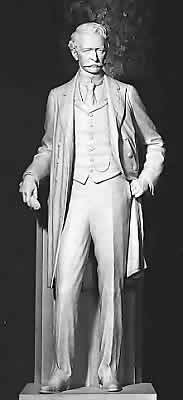This is an old revision of this page, as edited by Deisenbe (talk | contribs) at 10:29, 19 April 2019 (→References: various changes). The present address (URL) is a permanent link to this revision, which may differ significantly from the current revision.
Revision as of 10:29, 19 April 2019 by Deisenbe (talk | contribs) (→References: various changes)(diff) ← Previous revision | Latest revision (diff) | Newer revision → (diff)
Uriah Milton Rose (March 5, 1834 – August 12, 1913) was an American lawyer.
Born in Bradfordsville, Kentucky, on March 5, 1834, Rose was studying Latin at age 5 and received an excellent education until his father died in 1849. When Rose was 17, lawyer R.H. Roundtree hired him as a deputy county clerk while he studied law at night at Transylvania University. After graduating in 1853, in search of warmer weather, Rose, his wife, and his brother-in-law William T. Gibbs moved to Batesville, Arkansas in 1853. He set up a law practice there in partnership with Gibbs. The Roses had three children.
In 1860 he was appointed chancellor (chancery judge and chief county officer) of Pulaski County; "county judges in Arkansas have served for decades as one of the strongest political forces in the state." "The chancellor's office was the only such office in the state and thus had statewide jurisdiction." He held this position until Union forces captured the state capital on September 1, 1863. Although he opposed secession, he remained loyal to Arkansas throughout the Civil War.
Moving to Little Rock in 1865, where he and his wife had four additional children, he joined "the oldest law firm west of the Mississippi." He opened the Rose Law Firm in partnership with George C. Watkins, former chief justice of Arkansas. It is not only the oldest law company west of the Mississippi, it was the first company of any sort in the state of Arkansas.
Two years later Rose published the Digest of the Arkansas Reports. A man of learning in the law, science, and literature, Rose could read German and speak French fluently; he was also a noted public speaker. His library contained over 8,000 volumes in various languages. In 1891 he published The Constitution of the State of Arkansas, with notes. He was an influential member of the Arkansas Bar Association, serving as its president from 1899 to 1900; he was a charter member of the American Bar Association and its president from 1901 to 1902. President Theodore Roosevelt appointed him a delegate to the Second Peace Conference at The Hague in 1907.
Rose died at his home in Little Rock, Arkansas, on August 12, 1913. In 1917, the state of Arkansas donated a marble statue of Rose to the U.S. Capitol's National Statuary Hall Collection. In 2019 the decision was made to replace his statue, and that of James Paul Clarke, with statues of Johnny Cash and Daisy Lee Gatson Bates. In the case of Rose, the reason stated is that despite his opposition to secession, "he sided with the Confederacy".
In 1944, a United States Liberty ship named the SS Uriah M. Rose was launched. She was scrapped in 1972.
External links
| Rose Law Firm | |
|---|---|
| Founders | |
| Prominent partners | |
| Prominent clients | |
- ^ Bird II, Allen W. (2019). "Uriah Milton Rose (1834–1913)". Encyclopedia of Arkansas. Central Arkansas Library System. Retrieved April 15, 2019.
- Goss, Kay C. (2018). "County Judge, Office of". Encyclopedia of Arkansas. Central Arkansas Library System. Retrieved April 15, 2019.
- "Rose Law Firm". Retrieved April 15, 2019.
- Peters, Ben (April 17, 2019). "Johnny Cash is replacing one of the Capitol's Civil War statues". Roll Call.
- Itkowitz, Colby (April 17, 2019). "Johnny Cash to replace Confederate statue on Capitol Hill". Washington Post.